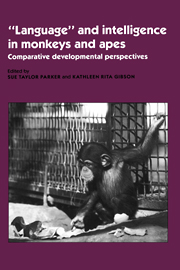Book contents
- Frontmatter
- Contents
- List of contributors
- Foreword
- Preface
- Acknowledgments
- Part I Theoretical frameworks for comparative developmental studies
- Part II Comparative developmental perspectives on cebus intelligence
- Part III Questions regarding imitation, “language,” and cultural transmission in apes and monkeys
- Part IV Developmental perspectives on social intelligence and communication in great apes
- Part V Development of numerical and classificatory abilities in chimpanzees and other vertebrates
- Part VI Comparative developmental perspectives on ape “language”
- Index
Preface
Published online by Cambridge University Press: 11 May 2010
- Frontmatter
- Contents
- List of contributors
- Foreword
- Preface
- Acknowledgments
- Part I Theoretical frameworks for comparative developmental studies
- Part II Comparative developmental perspectives on cebus intelligence
- Part III Questions regarding imitation, “language,” and cultural transmission in apes and monkeys
- Part IV Developmental perspectives on social intelligence and communication in great apes
- Part V Development of numerical and classificatory abilities in chimpanzees and other vertebrates
- Part VI Comparative developmental perspectives on ape “language”
- Index
Summary
The editors conceived this book with the double purpose of introducing to a larger public a new approach to the study of animal abilities and of stimulating additional studies in the new research program described in this volume. This research program, which we call “comparative developmental evolutionary psychology,” is based on the application of frameworks from human developmental psychology and evolutionary biology to comparative studies of primate abilities. All of the studies reported in this volume are either directly or indirectly developmental; that is, they either trace the ontogenetic development of specific abilities within developmental frameworks or use such frameworks to compare the nature and level of abilities of their subjects to those of human infants and children at various stages of development. None of the studies in this volume have been published elsewhere. The majority of the chapters grew out of presentations made at a 3-day workshop held as a presession of the Ninth International Congress of Primatology at Göttingen, West Germany, in July 1986. The additional chapters are by colleagues of the original contributors or by researchers whose work we discovered subsequent to the workshop.
This book is the second volume devoted specifically and exclusively to studies of animal intelligence and cognition based on comparative developmental (Piagetian, neo-Piagetian, and developmental psycholinguistic) perspectives. The first volume, which was published last year, reported on long-term studies of intellectual development in cebus, gorillas, and macaques at the Comparative Psychology Laboratory at the Consiglio Nazionale delle Ricerche (CNR) in Rome (Antinucci, 1989). Several members of that laboratory are contributors to this book.
Information
- Type
- Chapter
- Information
- 'Language' and Intelligence in Monkeys and ApesComparative Developmental Perspectives, pp. xiv - xviPublisher: Cambridge University PressPrint publication year: 1990
